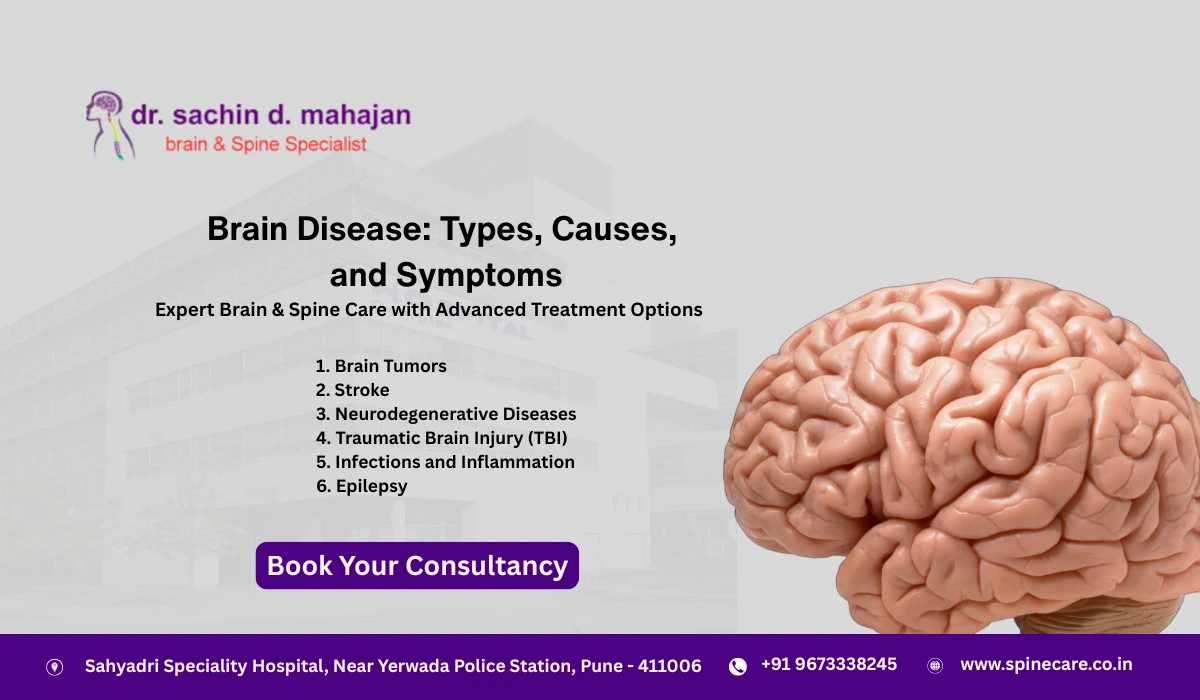
Brain Disease: Types, Causes, and Symptoms
The brain is the control center of the human body, regulating thoughts, emotions, movements, and vital functions. When brain health is compromised, it can affect every aspect of life. From mild conditions like headaches to life-threatening diseases such as tumors or strokes, understanding brain disorders is essential for timely diagnosis and treatment.
In this blog, we’ll discuss the most common types of brain diseases, their causes, symptoms, and when to seek expert help from a brain specialist in Pune.
Understanding Brain Diseases
Brain diseases refer to conditions that affect the structure and function of the brain. These disorders can be:
- Neurological (affecting the nervous system)
- Psychiatric (impacting mood, behavior, and thinking)
- Degenerative (progressively worsening over time)
- Traumatic (caused by injury or accidents)
Early recognition of symptoms and proper medical intervention can make a significant difference in outcomes.
Types of Brain Diseases
Brain disorders are classified into several categories depending on their cause and impact.
1. Brain Tumors
Brain tumors occur when abnormal cells grow in or around the brain. They can be benign (non-cancerous) or malignant (cancerous).
- Causes: Genetic mutations, family history, prolonged radiation exposure.
- Symptoms: Persistent headaches, vision problems, seizures, nausea, personality changes.
- Treatment: Surgery, radiation therapy, chemotherapy. In advanced centers, Brain Tumor Surgery in Pune offers minimally invasive approaches, improving recovery and reducing risks.
2. Stroke
A stroke occurs when blood supply to the brain is interrupted, leading to oxygen deprivation.
- Causes: Blood clots (ischemic stroke), burst blood vessels (hemorrhagic stroke).
- Symptoms: Sudden weakness on one side, slurred speech, loss of balance, vision problems.
- Treatment: Emergency medications, clot removal, or surgical interventions. Prompt treatment by a neurosurgeon can save lives.
3. Neurodegenerative Diseases
These are progressive disorders where brain cells gradually deteriorate.
- Examples: Alzheimer’s disease, Parkinson’s disease, Huntington’s disease.
- Symptoms: Memory loss, difficulty walking, tremors, mood changes.
- Treatment: While there is no permanent cure, early intervention can slow progression and improve quality of life.
4. Traumatic Brain Injury (TBI)
Caused by external force such as accidents, sports injuries, or falls.
- Symptoms: Confusion, dizziness, headaches, memory loss, loss of consciousness.
- Treatment: Rest, medications, rehabilitation, or surgery in severe cases.
5. Infections and Inflammation
- Examples: Meningitis, Encephalitis, Brain abscess.
- Symptoms: Fever, neck stiffness, severe headaches, seizures.
- Treatment: Antibiotics, antiviral drugs, and supportive hospital care.
6. Epilepsy
A chronic condition characterized by recurrent seizures.
- Causes: Genetic disorders, brain injury, infections, or unknown reasons.
- Symptoms: Convulsions, fainting, sudden stiffness, loss of awareness.
- Treatment: Medications, lifestyle management, and in some cases, surgery.
Common Causes of Brain Diseases
Brain diseases can result from a combination of genetic, environmental, and lifestyle factors. Common causes include:
- Genetic predisposition – inherited conditions like Huntington’s or epilepsy.
- Head trauma – accidents leading to traumatic brain injury.
- Vascular issues – high blood pressure, cholesterol, diabetes leading to stroke.
- Infections – bacterial or viral infections damaging brain tissues.
- Tumor growth – uncontrolled cell division causing brain tumors.
- Lifestyle factors – smoking, alcohol abuse, poor diet, and lack of exercise.
Early Symptoms That Should Not Be Ignored
Recognizing warning signs of brain disorders is crucial for timely treatment. Consult a brain specialist in Pune if you or a loved one experience:
- Persistent headaches or migraines.
- Sudden memory loss or confusion.
- Seizures or convulsions.
- Loss of coordination or balance.
- Difficulty speaking or understanding language.
- Vision disturbances (blurry or double vision).
- Personality or behavioral changes.
Diagnosis of Brain Diseases
Modern healthcare facilities in Pune offer advanced diagnostic tools to detect brain disorders:
- MRI and CT scans – Detailed imaging for tumors, injuries, or structural abnormalities.
- EEG (Electroencephalogram) – Monitors electrical activity in the brain for epilepsy.
- PET scans – Detects cancerous cells and brain activity.
- Blood tests & Biopsies – Identify infections or abnormal growths.
Accurate diagnosis by a spine and brain specialist ensures correct treatment planning.
Treatment Options for Brain Diseases
Treatment varies depending on the type and severity of the disease.
- Medications – For managing epilepsy, infections, or initial stages of neurological disorders.
- Surgical Treatments – Advanced centers perform Brain Tumor Surgery in Pune, aneurysm clipping, or microvascular decompression.
- Minimally Invasive Procedures – Keyhole and endoscopic surgeries that reduce recovery time.
- Rehabilitation Programs – Physiotherapy, speech therapy, and occupational therapy post-surgery.
- Lifestyle Modifications – Healthy diet, regular exercise, quitting smoking, and stress management.
Why Pune is Emerging as a Hub for Brain Care
Pune has rapidly grown into a center for advanced neurological and neurosurgical care because of:
- Highly qualified neurosurgeons with international exposure.
- Advanced technologies like intraoperative MRI and neuro-navigation.
- Affordable treatment compared to metropolitan cities like Mumbai and Delhi.
- Multidisciplinary teams including neurosurgeons, oncologists, neurologists, and rehabilitation experts.
- Specialized care for conditions like tumors, strokes, and epilepsy.
Patients looking for Brain Tumor Surgery in Pune or other neurological treatments benefit from world-class care at competitive costs.
Preventing Brain Diseases
While not all brain disorders are preventable, adopting a healthy lifestyle can significantly lower the risk:
- Maintain healthy blood pressure and sugar levels.
- Eat a balanced diet rich in omega-3 fatty acids.
- Exercise regularly to improve blood circulation.
- Avoid smoking and excessive alcohol.
- Protect your head with helmets and seat belts.
- Regular health check-ups for early detection.
When to See a Specialist
If you notice persistent neurological symptoms, it’s crucial to consult a brain specialist in Pune at the earliest. Early diagnosis and treatment often improve recovery chances and reduce long-term complications.
Conclusion
Brain diseases are complex, but with advancements in medical science, effective treatments are available today. From infections and epilepsy to life-threatening conditions like tumors or strokes, timely consultation and intervention are vital. Pune has established itself as a trusted destination for advanced neurological care, offering expertise, technology, and compassionate patient support.
If you or your loved one is showing symptoms of a brain disorder, don’t delay. Consult a qualified neurosurgeon and explore advanced treatment options like Best Brain Tumor Surgeon in Pune for better health outcomes.




